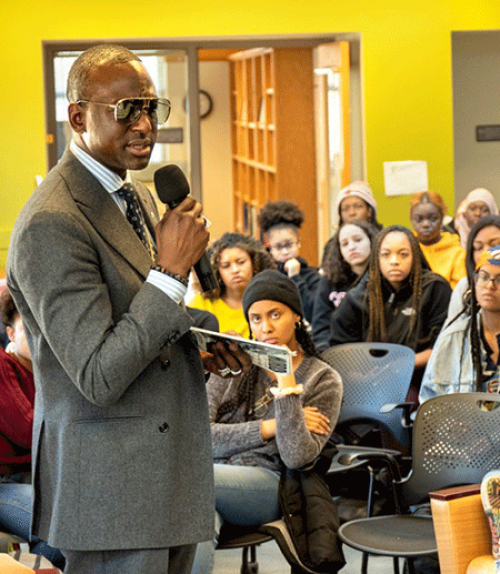Criminal justice activist Yusef Salaam, one of “The Exonerated Five” wrongly accused and convicted in the Central Park jogger case in New York City three decades ago, offered wisdom and hope to students and community members in the 2020 Martin Luther King Jr. Commemorative Lecture, Feb. 17 in Sage Chapel.
Salaam and four other teenagers were subjected to intense media coverage starting in 1989, and were known collectively for more than 20 years as “The Central Park Five.” Salaam spent more than six years in jail, first as a youth, then as an adult when he was transferred at age 21 to Clinton Correctional Facility in Dannemora. The convictions of all five men were voided in 2002 by the New York State Supreme Court in Manhattan.
In a conversation with Anna Haskins, assistant professor of sociology, Salaam reflected on the experience and what he’d learned from it.
Criminal justice activist Yusef Salaam speaks with Anna Haskins, assistant professor of sociology, Feb. 17 in Sage Chapel.
Haskins’ research assesses the effects of parental incarceration on their children’s educational outcomes and engagement in schooling.
Saying “you could have chosen a different path” after prison, Haskins asked Salaam why he chose a public life. He said he thought others could benefit from what he’d learned.
“Surely, after difficulty, there is relief,” he said. “There’s more to do, in this life … and I could continue to plant seeds in young minds, to be the realization of Dr. Martin Luther King’s dream, walking in this world together.”
Salaam earned a college degree in prison – “You can come out better, and not come out bitter,” he said – and, once free, went to work at NewYork-Presbyterian Hospital in Manhattan.
He is now a father and a published poet, and works with the Innocence Project and similar causes to educate the public on issues of mass incarceration, police brutality and misconduct, and America’s criminal justice system and its impacts on people of color.
Salaam addressed those issues, which are ongoing, in an informal talk with students at the Office of Academic Diversity Initiatives earlier in the day.
“The rest of the world is trying to make you believe the system works,” he said. “But the 13th Amendment says if you commit a crime, you can be enslaved again. We’re trying to fix the thing that’s broken.”
For those interested in the calling “to serve and protect,” he encouraged them to be the best police, judges and prosecutors they can be, and to speak out when they see injustice.
Yusef Salaam poses for a photo with James Turner, the founding director of the Africana Studies and Research Center, Feb. 17 at the Greater Ithaca Activities Center.
He also underscored the important role faith has played for him: “I was able to apply Islam to my life in a way I could not have done, had I not gone to prison.”
Regarding the media coverage surrounding the case against five teens, he referenced the New York Post and Spike Lee’s “Do the Right Thing.”
“We were made into pariahs,” he said. “There were 400 articles in the first few weeks – a tsunami of media coverage.”
Salaam also participated in a discussion with community members at the Greater Ithaca Activities Center.
The commemorative lecture at Cornell – an annual event honoring the service, activism and legacy of civil rights leader Martin Luther King Jr. – is sponsored by the Office of Spirituality and Meaning Making and OADI.




